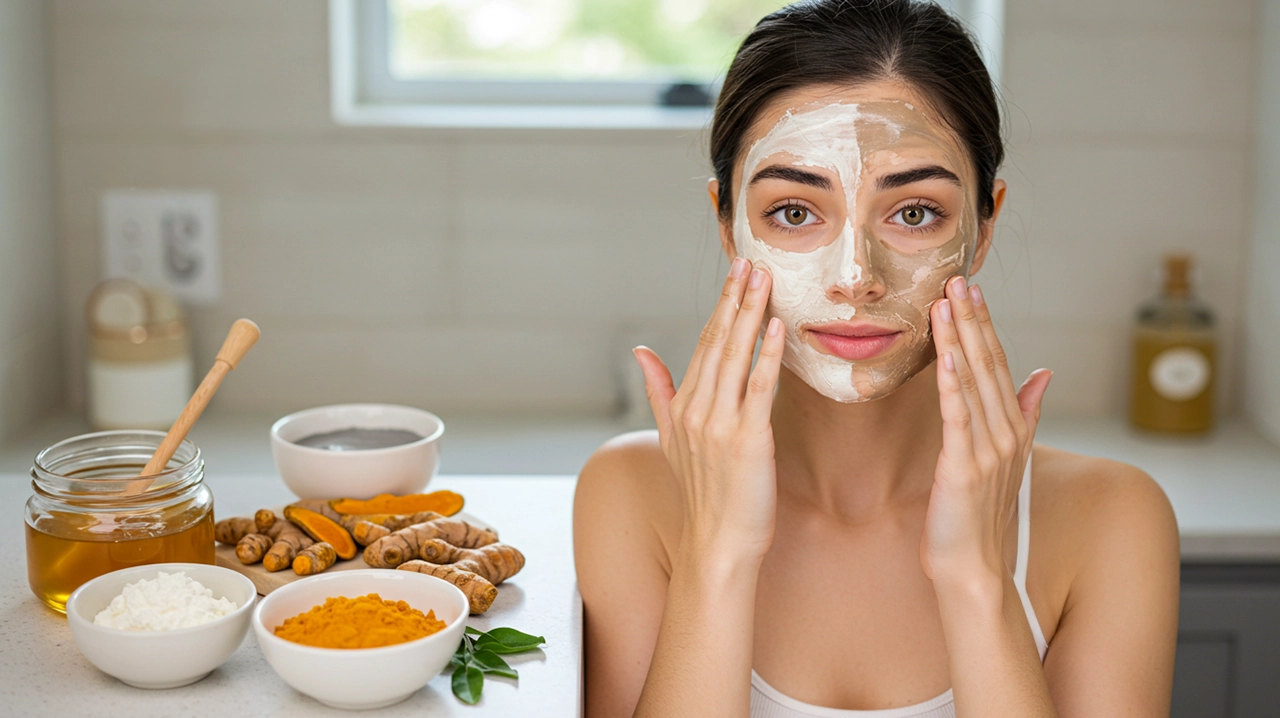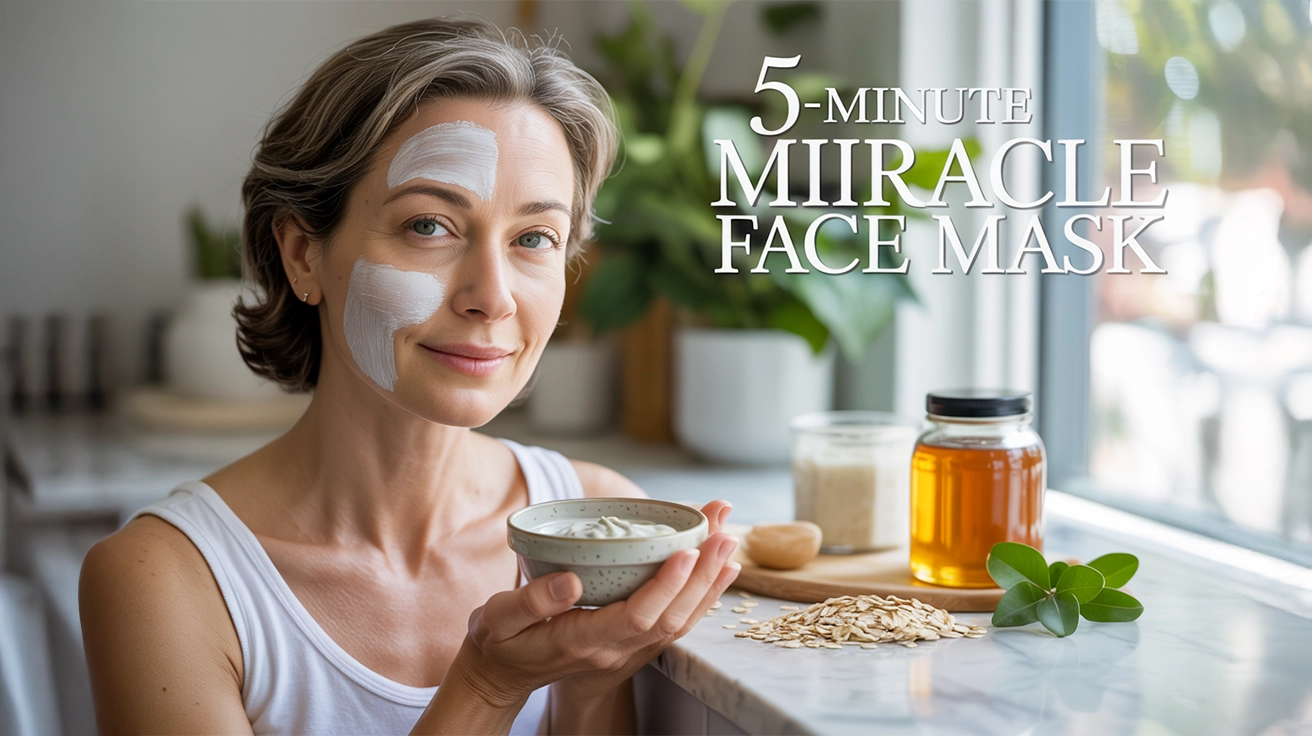

Are you tired of battling oily skin and constantly searching for products that actually work? 😫 You’re not alone! Oily skin can be a frustrating challenge, leaving you feeling self-conscious and constantly reaching for blotting papers.
But what if we told you that the solution to your skincare woes might be hiding right in your kitchen? 🍯🥑
Homemade face masks could be the game-changer you’ve been looking for in your skincare routine. They’re not only budget-friendly and free from harsh chemicals, but also let you customize ingredients for your skin’s needs. Imagine controlling excess oil, minimizing pores, and achieving a matte finish – all with natural, easy-to-pronounce ingredients! 🌿✨
In this blog post, we’ll dive into the world of DIY face masks for oily skin. First, we’ll explore the root causes of oily skin and the key ingredients that help combat excess sebum.
You will find easy clay masks, fruit-based solutions, herbal remedies, and activated charcoal treatments. These can change your skincare routine.
So, are you ready to say goodbye to shine and hello to a radiant, balanced complexion? Let’s get started!
You might wonder why your skin produces excess oil. Several factors contribute to this condition:
Genetics: If your parents have oily skin, you’re more likely to have it too.
Hormonal changes: Puberty, menstruation, and pregnancy can increase oil production.
Climate: Hot, humid weather can stimulate your sebaceous glands.
Diet: Consuming too many sugary or fatty foods may exacerbate oily skin.
Skincare routine: Over-cleansing or using harsh products can strip your skin, causing it to produce more oil.
Face masks offer numerous advantages for your oily skin:
Deep cleansing
Pore refinement
Oil control
Hydration balance
Skin soothing
| Benefit | Description |
|---|---|
| Deep cleansing | Removes impurities and excess oil |
| Pore refinement | Minimizes the appearance of enlarged pores |
| Oil control | Regulates sebum production |
| Hydration balance | Moisturizes without adding excess oil |
| Skin soothing | Calms irritation and redness |
Face masks are effective in managing your oily skin by:
Absorbing excess sebum: Ingredients like clay and charcoal act like magnets for oil.
Balancing skin pH: This helps normalize oil production.
Exfoliating: Removing dead skin cells prevents pore clogging.
Providing targeted treatment: Masks allow active ingredients to penetrate deeply.
By incorporating face masks into your skincare routine, you’re giving your oily skin the attention it needs. Regular use can lead to a more balanced complexion and reduced shine.
Clay is a powerhouse ingredient for oily skin masks. Its absorbent properties help draw out excess oil and impurities from your pores. Here are some popular clay types for your homemade masks:
| Clay Type | Benefits for Oily Skin |
|---|---|
| Bentonite | Highly absorbent, detoxifying |
| Kaolin | Gentle, suitable for sensitive skin |
| French Green | Rich in minerals, tightens pores |
| Rhassoul | Balances skin’s natural oils |
Natural astringents can help tighten pores and reduce oil production. Incorporate these ingredients into your masks for added benefits:
Witch hazel
Apple cider vinegar
Green tea
Lemon juice (use sparingly)
These ingredients work wonders in soaking up excess sebum:
Activated charcoal
Oatmeal
Rice flour
Egg whites
Balance oil control with soothing ingredients to prevent irritation:
Aloe vera
Chamomile
Lavender
Cucumber
By combining these key ingredients, you can create effective homemade masks tailored to your oily skin needs. Now, let’s explore some simple clay mask recipes you can easily make at home.
You’ll love this powerful combination for combating oily skin. Bentonite clay absorbs excess oil, while apple cider vinegar balances your skin’s pH. Here’s a simple recipe:
| Ingredient | Amount |
|---|---|
| Bentonite clay | 1 tablespoon |
| Apple cider vinegar | 1-2 teaspoons |
| Water | As needed |
Mix the ingredients to form a smooth paste. Apply to your face, avoiding the eye area. Leave on for 10-15 minutes before rinsing with lukewarm water.
This mask is perfect for those dealing with both oily and acne-prone skin. French green clay draws out impurities, while tea tree oil provides antibacterial benefits. Here’s how to make it:
1 tablespoon French green clay
2-3 drops of tea tree oil
Water or rosewater to mix
Combine the ingredients and apply to your face. Let it dry for 10-12 minutes before washing off.
For a gentler option that’s still effective for oily skin, try this kaolin clay and witch hazel mask. Kaolin clay is mild yet absorbent, and witch hazel helps tighten pores. Here’s what you need:
1 tablespoon kaolin clay
1 teaspoon witch hazel
A few drops of water
Mix into a smooth paste and apply. Leave on for 15 minutes, then rinse thoroughly.
Now that you’ve learned about these simple homemade clay masks, let’s explore some fruit-based options for oil control.
You’ll love this nourishing mask that combines the enzymatic properties of papaya with the antibacterial benefits of honey. Here’s how to make it:
Mash 1/4 cup ripe papaya
Mix in 1 tablespoon raw honey
Apply to clean face for 15-20 minutes
Rinse with lukewarm water
The papain enzyme in papaya gently exfoliates, while honey helps balance oil production.
This mask is perfect for controlling excess oil and brightening your complexion:
Mash 1/2 ripe banana
Add 1 teaspoon fresh lemon juice
Mix well and apply for 15 minutes
Rinse thoroughly
Banana soothes and moisturizes, while lemon’s astringent properties help tighten pores.
Strawberries are rich in salicylic acid, making them ideal for oily skin:
Mash 3-4 fresh strawberries
Mix with 2 tablespoons plain yogurt
Apply for 15-20 minutes
Rinse with cool water
The lactic acid in yogurt helps exfoliate and balance skin pH.
This mask combines the astringent properties of green apple with the soothing effects of oatmeal:
| Ingredient | Amount | Benefit |
|---|---|---|
| Green apple | 1/4, grated | Tightens pores |
| Oatmeal | 2 tbsp, ground | Absorbs excess oil |
| Honey | 1 tsp | Antibacterial |
Mix ingredients, apply for 15 minutes, then rinse. This mask helps control oil while gently exfoliating your skin.
Now that you’ve looked at these fruit masks, let’s check out some herbal and plant options. These can help improve your oily skin care routine.
You can harness the power of nature with this potent neem and turmeric mask. Neem, known for its antibacterial properties, helps combat acne-causing bacteria, while turmeric’s anti-inflammatory effects soothe irritated skin. Here’s how to make this herbal face mask for oily skin:
| Ingredient | Amount | Benefit |
|---|---|---|
| Neem powder | 1 tablespoon | Antibacterial, reduces excess oil |
| Turmeric powder | 1/4 teaspoon | Anti-inflammatory, brightens skin |
| Yogurt | 2 tablespoons | Moisturizes, contains lactic acid |
Mix these ingredients into a smooth paste and apply to your face for 15-20 minutes before rinsing off with lukewarm water.
For a cooling and refreshing experience, try this aloe vera and mint mask. Aloe vera helps balance oil production while mint provides a soothing, tingly sensation. Here’s a simple recipe:
2 tablespoons fresh aloe vera gel
1 tablespoon finely chopped fresh mint leaves
1 teaspoon honey (optional, for extra hydration)
Blend these ingredients and apply the mixture to your face for 10-15 minutes. Rinse off with cool water for an invigorating finish.
Green tea is full of antioxidants that help fight free radicals. Rice flour gently exfoliates and absorbs extra oil. To make this mask:
Brew a strong cup of green tea and let it cool
Mix 2 tablespoons of rice flour with enough green tea to form a paste
Add a few drops of tea tree oil for extra oil-fighting power
Put this mask on your face and neck. Leave it on for 15 to 20 minutes. Then, gently massage in circular motions while rinsing it off with warm water.
Now that you’ve looked at these herbal and botanical masks, let’s try another great option for oily skin: DIY charcoal masks for deep cleansing.
Charcoal masks are excellent for deep cleansing oily skin, and when combined with egg whites, they become even more effective. Here’s a simple recipe you can try:
| Ingredient | Amount |
|---|---|
| Activated charcoal powder | 1 tablespoon |
| Egg white | 1 |
| Lemon juice | 1/2 teaspoon |
Mix these ingredients until you get a smooth paste. Apply to your face, avoiding the eye area, and leave on for 15-20 minutes before rinsing off with lukewarm water.
This soothing combination helps to cleanse and calm oily skin:
1 tablespoon activated charcoal powder
2 tablespoons pure aloe vera gel
5 drops of tea tree essential oil (optional)
Blend the ingredients well and apply to your face. Leave on for 10-15 minutes, then rinse off gently.
For those battling both oiliness and acne, this mask can be particularly beneficial:
Mix 1 tablespoon activated charcoal powder with 1 tablespoon bentonite clay
Add 2 tablespoons of water or rose water
Include 2-3 drops of tea tree oil
Apply this mixture to your face and neck, leave for 10 minutes, then rinse off thoroughly.
Remember, these DIY charcoal masks are good for deep cleansing. Use them no more than once or twice a week. This will help avoid over-drying your skin.
Now that you know about these great charcoal masks, let’s look at some important tips for using them. This will help you get the best results from your homemade face masks.
To get the most out of your homemade face masks for oily skin, it’s crucial to apply them correctly. Here’s a step-by-step guide:
Cleanse your face thoroughly
Apply the mask evenly using clean fingers or a brush
Avoid the eye and mouth areas
Leave on for the recommended time (usually 10-15 minutes)
Rinse off with lukewarm water
Pat dry with a clean towel
Finding the right balance is key when using face masks for oily skin. Here’s a general guideline:
| Skin Type | Recommended Frequency |
|---|---|
| Oily | 2-3 times per week |
| Combination | 1-2 times per week |
| Sensitive | 1 time per week |
Remember, over-masking can strip your skin of natural oils, leading to increased oil production. Listen to your skin and adjust accordingly.
After removing your mask, follow these steps to maximize benefits:
Apply an alcohol-free toner
Use a lightweight, oil-free moisturizer
If daytime, finish with a non-comedogenic sunscreen
To keep your DIY masks fresh and effective:
Store in an airtight container
Keep refrigerated if using perishable ingredients
Use within 3-5 days for fruit-based masks
Clay and charcoal masks can last up to 2 weeks if properly stored
By using these tips for application and usage, you can improve your homemade face masks. This will help keep your skin healthy and balanced. Remember to patch test new ingredients and discontinue use if irritation occurs.
Crafting homemade face masks for oily skin can be a game-changer in your skincare routine. By knowing your skin type and using important ingredients like clay, fruits, herbs, and charcoal, you can make masks that suit your needs. These DIY solutions not only help control excess oil but also provide deep cleansing and nourishment for your skin.
Remember, consistency is key in skincare. Add these homemade masks to your weekly routine, following the application tips. With regular use, you’ll likely notice improvements in your skin’s texture and oil balance.
Feel free to experiment with different ingredients to find the perfect combination for your skin. By using these natural, cost-effective solutions, you’re on your way to a healthier, more balanced complexion.

Your go-to guide for all things beauty and wellness, with a knack for uncovering the secrets to radiant skin and a balanced life.
Your Ultimate Guide to Healthy, Glowing Skin – Expert Tips, Honest Reviews & Skincare Secrets!
Sign up our newsletter to get update tips, honest reviews & skincare secrets!